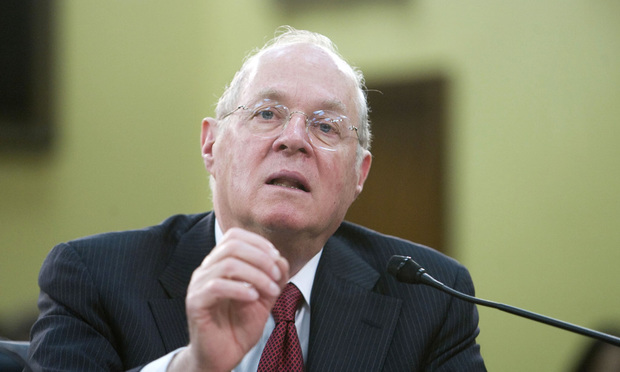With Kennedy's Exit, California Loses a Singular Voice on the Supreme Court
Justice Anthony Kennedy offered a West Coast brand of conservatism that spoke to his roots and made the U.S. Supreme Court feel less alien.
July 03, 2018 at 09:18 PM
5 minute read
 Justice Anthony Kennedy. (Photo: Diego M. Radzinschi/ALM)
Justice Anthony Kennedy. (Photo: Diego M. Radzinschi/ALM) Justice Anthony Kennedy may not have been everything California wanted in a Supreme Court justice. But he was a native son.
Born in Sacramento, Kennedy delivered rulings in his three decades on the high court that bitterly disappointed the state's liberal voters—but also some they could celebrate. He authored the 2015 decision establishing marriage equality; sided, at least sometimes, with abortion rights advocates; and led the court to outlaw the death penalty for juvenile offenders.
For California lawyers, Kennedy's departure during an era of bitter partisanship brings a sense not only that the Supreme Court is bound to grow more conservative but also that it's losing touch with a West Coast brand of conservatism that takes a more compassionate view on social issues like gay marriage, affirmative action and abortion rights.
➤ READ MORE: Countdown to the Nomination: Who Will Fill Kennedy's Seat
"What the Supreme Court and California, and in some ways America, are losing is a justice [whose approach] to laws captures Western conservatism, at least toward the mid-to-late 20th century," said Ben Feuer, chairman of the California Appellate Law Group. "That is an approach that is largely going to favor liberty, often for business against government intrusion, but still has a baseline level of respect for individual decisions that are outside of the mainstream."
There are no Californians on President Donald Trump's shortlist of potential nominees, which favors judges from Midwestern and Eastern states.
"That's a shame,” said Rory Little, a professor of law at UC-Hastings, “because I think geographic diversity is as important as all sorts of other diversity concerns."
Kennedy brought individualism and independence to the court, Little said, traits he associates with the Golden State.
Kennedy grew up in Sacramento, where his father practiced law and attended college at Stanford University. He went on to graduate from Harvard Law School and returned to California and took over his father's law practice. Then-Gov. Ronald Reagan recommended Kennedy's appointment to the U.S. Court of Appeals for the Ninth Circuit in 1975, and Kennedy served on the appeals court until his confirmation to the U.S. Supreme Court in 1988.
Erwin Chemerinsky, dean of UC-Berkeley School of Law, noted in an email that Kennedy represented "views parallel those of moderate conservatives from all areas of the country," views he said could be missing from the Supreme Court in the near future.
There are a lot of ways to analyze diversity on the Supreme Court. Racial and gender diversity have been pressing concerns, with academic and geographic diversity often deemed secondary considerations. But once Kennedy departs, the Supreme Court will skew even more heavily toward the Northeast.
The main outliers are Justice Neil Gorsuch, who was born in Denver and served on the U.S. Court of Appeals for the Tenth Circuit and Justice Clarence Thomas, who grew up in Savannah, Georgia, and practiced law in Missouri before career opportunities brought him to Washington, D.C. Justice Stephen Breyer was born in California and like Kennedy attended Stanford University and Harvard Law School. However, Breyer's career led him to the East Coast, from Washington, D.C., to a teaching post at Harvard Law School to a seat on the U.S. Court of Appeals for the First Circuit.
Michael Schwartz, dean of the University of the Pacific's McGeorge School of Law, where Kennedy has a long affiliation, said the impact of Sacramento on Kennedy's politics was apparent.
"Justice Kennedy's judicial and political views were very consistent with the purple-ish politics of Sacramento, when he grew up and when he came of age as an attorney practicing in Sacramento," Schwartz said.
But Schwartz also noted that the Sacramento of Kennedy's youth is not the Sacramento of today—the city and California in general have shifted further left. That's especially true for issues such as gun rights, Schwartz noted.
Because Kennedy's home state has generally moved to the left of many of his own views, Feuer said it's unlikely the justice's retirement will change the dynamic for appellate lawyers arguing before the Ninth Circuit with an eye toward possible appeal before the U.S. Supreme Court.
While Kennedy's replacement may be more conservative, the seat will still likely move from one conservative to another. Feuer noted that in his last term, Kennedy sided with several rulings against California, including a state law requiring more transparency from crisis pregnancy centers.
"[It's] moving from a court that was pretty conservative to one that will probably be more conservative," Feuer said. "It won't change the way the Ninth Circuit does business."
That doesn't mean the loss of a Ninth Circuit alum on the court will be painless. Little noted that Kennedy's retirement comes at a time when both Congress and the White House are in Republican hands. Shifting the Supreme Court further right, while also losing a California justice, may lead to further alienation in the majority-blue state.
"It's too bad," Little said. "California is a major population center and a major economic center, and to feel that we're not represented in any branch of the government is not a good thing."
READ MORE:
Pacific McGeorge Law Hopes to See More of Kennedy Post-SCOTUS
This content has been archived. It is available through our partners, LexisNexis® and Bloomberg Law.
To view this content, please continue to their sites.
Not a Lexis Subscriber?
Subscribe Now
Not a Bloomberg Law Subscriber?
Subscribe Now
NOT FOR REPRINT
© 2025 ALM Global, LLC, All Rights Reserved. Request academic re-use from www.copyright.com. All other uses, submit a request to [email protected]. For more information visit Asset & Logo Licensing.
You Might Like
View All

Colgate Faces Class Actions Over ‘Deceptive Marketing’ of Children’s Toothpaste

'A Death Sentence for TikTok'?: Litigators and Experts Weigh Impact of Potential Ban on Creators and Data Privacy
Trending Stories
- 1Morgan Lewis Says Global Clients Are Noticing ‘Expanded Capacity’ After Kramer Merger in Paris
- 2'Reverse Robin Hood': Capital One Swarmed With Class Actions Alleging Theft of Influencer Commissions in January
- 3Hawaii wildfire victims spared from testifying after last-minute deal over $4B settlement
- 4How We Won It: Latham Secures Back-to-Back ITC Patent Wins for California Companies
- 5Meta agrees to pay $25 million to settle lawsuit from Trump after Jan. 6 suspension
Who Got The Work
J. Brugh Lower of Gibbons has entered an appearance for industrial equipment supplier Devco Corporation in a pending trademark infringement lawsuit. The suit, accusing the defendant of selling knock-off Graco products, was filed Dec. 18 in New Jersey District Court by Rivkin Radler on behalf of Graco Inc. and Graco Minnesota. The case, assigned to U.S. District Judge Zahid N. Quraishi, is 3:24-cv-11294, Graco Inc. et al v. Devco Corporation.
Who Got The Work
Rebecca Maller-Stein and Kent A. Yalowitz of Arnold & Porter Kaye Scholer have entered their appearances for Hanaco Venture Capital and its executives, Lior Prosor and David Frankel, in a pending securities lawsuit. The action, filed on Dec. 24 in New York Southern District Court by Zell, Aron & Co. on behalf of Goldeneye Advisors, accuses the defendants of negligently and fraudulently managing the plaintiff's $1 million investment. The case, assigned to U.S. District Judge Vernon S. Broderick, is 1:24-cv-09918, Goldeneye Advisors, LLC v. Hanaco Venture Capital, Ltd. et al.
Who Got The Work
Attorneys from A&O Shearman has stepped in as defense counsel for Toronto-Dominion Bank and other defendants in a pending securities class action. The suit, filed Dec. 11 in New York Southern District Court by Bleichmar Fonti & Auld, accuses the defendants of concealing the bank's 'pervasive' deficiencies in regards to its compliance with the Bank Secrecy Act and the quality of its anti-money laundering controls. The case, assigned to U.S. District Judge Arun Subramanian, is 1:24-cv-09445, Gonzalez v. The Toronto-Dominion Bank et al.
Who Got The Work
Crown Castle International, a Pennsylvania company providing shared communications infrastructure, has turned to Luke D. Wolf of Gordon Rees Scully Mansukhani to fend off a pending breach-of-contract lawsuit. The court action, filed Nov. 25 in Michigan Eastern District Court by Hooper Hathaway PC on behalf of The Town Residences LLC, accuses Crown Castle of failing to transfer approximately $30,000 in utility payments from T-Mobile in breach of a roof-top lease and assignment agreement. The case, assigned to U.S. District Judge Susan K. Declercq, is 2:24-cv-13131, The Town Residences LLC v. T-Mobile US, Inc. et al.
Who Got The Work
Wilfred P. Coronato and Daniel M. Schwartz of McCarter & English have stepped in as defense counsel to Electrolux Home Products Inc. in a pending product liability lawsuit. The court action, filed Nov. 26 in New York Eastern District Court by Poulos Lopiccolo PC and Nagel Rice LLP on behalf of David Stern, alleges that the defendant's refrigerators’ drawers and shelving repeatedly break and fall apart within months after purchase. The case, assigned to U.S. District Judge Joan M. Azrack, is 2:24-cv-08204, Stern v. Electrolux Home Products, Inc.
Featured Firms
Law Offices of Gary Martin Hays & Associates, P.C.
(470) 294-1674
Law Offices of Mark E. Salomone
(857) 444-6468
Smith & Hassler
(713) 739-1250







